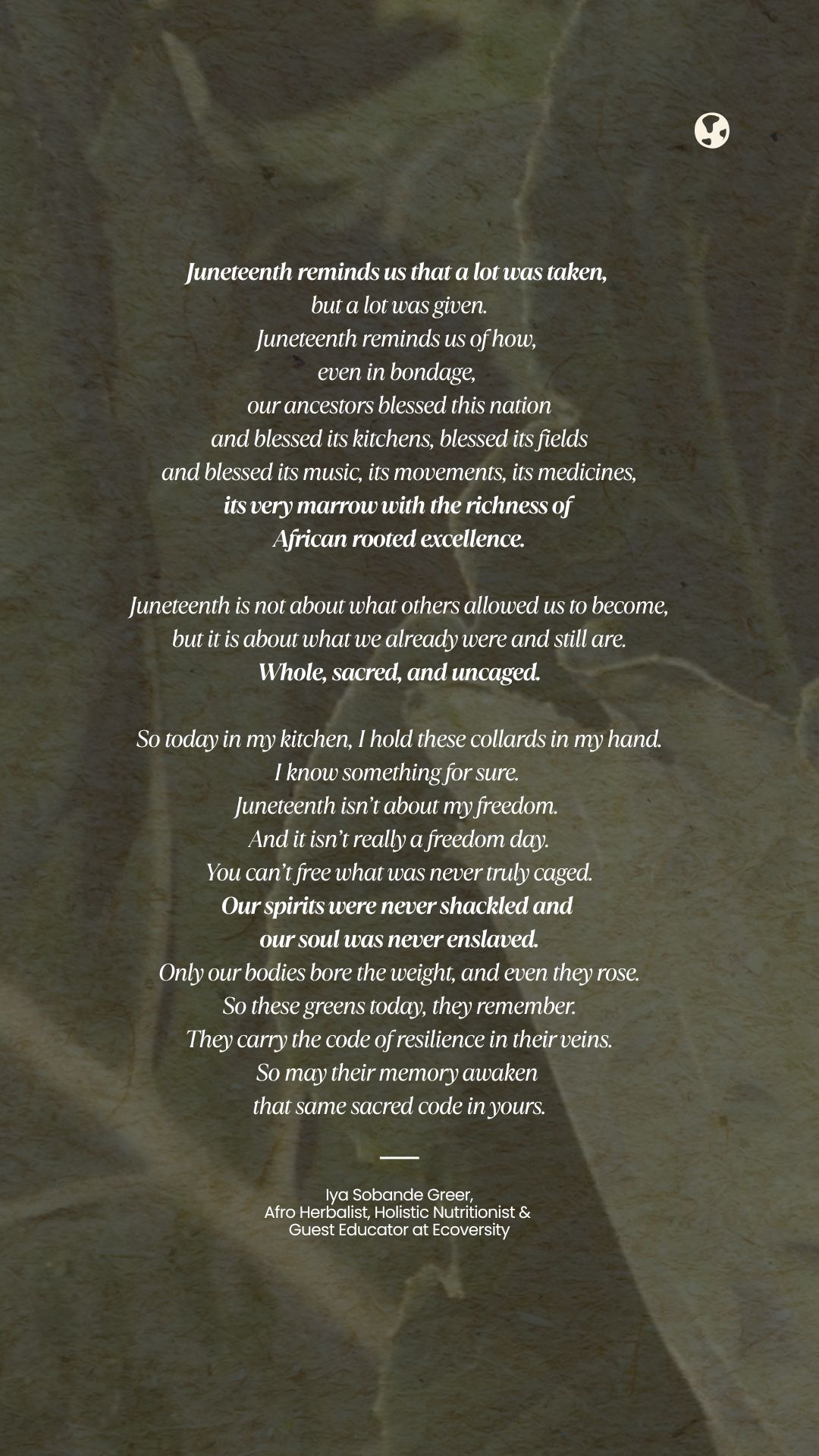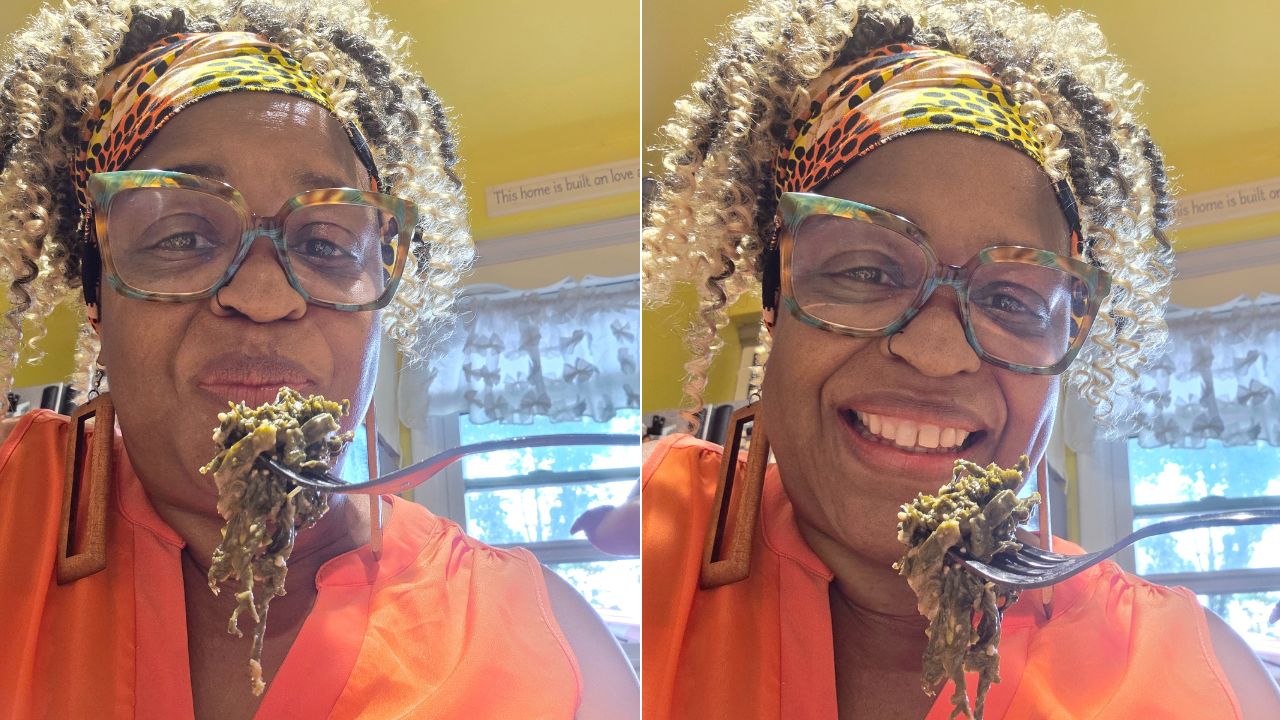
A Juneteenth Reflection with Iya Sobande Greer
Jun 19, 2025Above, you’ll find a special audio poem from Iya Sobande Greer, a 5th-generation herbalist, holistic nutritionist, and guest educator in Ecoversity’s 100-Hour Herbalism Program. As we celebrate Juneteenth, take a moment to listen to her words. She offers a prayer that helps us remember and honor our ancestors: those who cooked, healed, and made our lives possible today.
We didn’t expect to cry on Zoom.
But when we asked Iya Sobande Greer what plants reminded her of ancestral survival, she didn’t just give us an answer, she gave us a doorway.
“You got collard greens,” she said, like a bell ringing true.
And that opened a door.
She didn’t just talk to us. She took us to a memory. She brought us into her kitchen.
She reminded us that soul food isn’t just food, it’s a testimony.
A sacred memory of medicine that outlived the ones who first cooked them.
And we felt it in our bones.
In the days leading up to Juneteenth, we thought we were gathering quotes and reflections to mark the occasion. But what we received was a kitchen altar, that we’re sharing with you.
Illustration credit: "We are American" by Celeste Byers
What Is Juneteenth?
On June 19, 1865, more than 250,000 enslaved people in Texas were finally told they were free, two years after the Emancipation Proclamation was signed. A day we now honor as Juneteenth.
But the story of freedom didn’t start there.
Long before that day, enslaved Africans braided seeds into their hair as they were forced onto ships across the Atlantic. Seeds they prayed would sustain them. These tiny kernels from their homeland carried the twin promises of nourishment and healing.
The ships stole their names. Their land was taken. Their children were sold. But the seeds endured.
On unfamiliar soil, enslaved people planted what they had carried in hidden gardens plots behind slave quarters. Through the roots they dug, the bark they boiled, and the leaves they brewed into bitter tea, enslaved Africans preserved centuries of healing knowledge.
Today, we honor the survival of both the people and the plants.
And perhaps no plant tells this story more clearly than collard greens.
“How,” Iya Sobande Greer asks, “did these collards make their way from cast iron pots to the finest china this nation could offer. China we were never allowed to eat from?”
Image: Iya Sobande & Collard Greens in her kitchen
Lineage of Collard Greens
Collard greens, with their broad, waxy leaves and earthy aroma, are a cornerstone of Southern cuisine. But their roots stretch far beyond the red clay of the American South. Originally cultivated in ancient Greece and Rome, these resilient greens journeyed across oceans, eventually anchoring themselves in the gardens and kitchens of enslaved Africans in the United States.
When the transatlantic slave trade tore families from their homelands, it also severed access to familiar foodways. And yet, enslaved people carried something with them: memory. The collard greens they encountered in the American South bore a striking resemblance to traditional African crops.
In the face of profound deprivation, collard greens became more than food. Simmered low and slow with smoked meats and seasonings, they transformed into sustenance that restored strength and offered a moment of home in a hostile world. Today, collard greens continue to hold court on kitchen tables across the South and beyond. They are grown in backyard beds, served at family reunions, and offered as staples at Sunday dinners. But their true power lies not just in taste, but in testimony.
We invite you to listen.
This is not just a poem, it is a prayer. A song for the women who rose before dawn, stirred pots with weary hands, and passed down medicine in meals, in memory, in marrow.
Here's an excerpt from Iya Sobande Greer's "The Collards Remember" poem.

🎧 Press play at the top of the page to hear the full poem in its truest form.
As we sit with the meaning of Juneteenth, one question keeps echoing in our hearts:
How do we honor the ones who came before us?
Not just in history books, but in the rhythm of our days. In the food we prepare. In the breath we take. In the plants we remember.
That’s why we’re so honored to share the voices of powerful educators like Iya Sobande Greer.
If something stirs in you as you read or listen today, know this:
The remembering has already begun.
Want to share what this stirred in you?
We invite you to reach out to Iya Sobande Greer and let her know how her words moved you.
Instagram:
@iamsobandeg
Website:
https://naturalchoicesbotanica.com/
https://sacredwatersretreat.com/
To continue learning from Iya Sobande Greer and 15+ incredible herbal educators, join the waitlist for our 100-Hour Herbalism Program.
With love and reverence,
The Ecoversity Team




